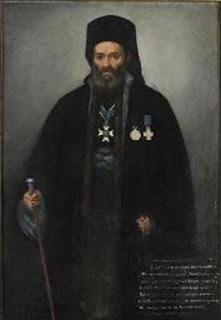Theodoretos of Vresthenes II
Bishop Theodoretos of Vresthenes II, a prominent figure in both the Orthodox Church and the Greek Revolution, was born in 1787 in Nemnitsa (modern-day Methydrio), a municipal district of the Municipality of Vitina, in Arcadia. His secular name was Thomas, and he came from a wealthy family.
From a young age, he dedicated himself to education, which he received from clerical teachers and also through self-study, showing genius and a love for knowledge. He became proficient in reading and speaking, later distinguishing himself as a highly capable preacher and theologian. He studied at the school in Dimitsana, and after graduating, he was ordained a monk.
In 1813, he was elected Bishop of Vresthenes, succeeding his uncle, also named Theodoretos. His episcopal seat was in Vamvakou, Laconia. From the beginning of his episcopacy, he devoted himself to missionary work and the spread of learning. He was a humble man who contributed first from his own pocket to support his educational and religious endeavors, setting an example for the faithful.
In 1818, he was initiated into the Friendly Society, and from 1819, he became actively involved in the patriotic movement. When the Greek Revolution of 1821 began, he temporarily left his ecclesiastical duties, donned the traditional Greek fustanella, and descended from Taygetos with a sword to join the revolutionary Greeks. He was called by Kolokotronis "Captain Bishop," and other contemporaries, such as Papaflessas and the Bishop of Elos Anthimos, followed his example by wearing the fustanella instead of the clerical robe.
Theodoretos distinguished himself in the Battle of Valtezi on May 12-13, 1821. As historian Ambrosios Frantzis notes, on the morning of May 13, he led approximately 800 people from Agiopetrites and Tsakones to reinforce the Greek fighters. Austrian diplomat and historian Anton Prokes von Osten highlights Theodoretos' significant contribution to the victory at Valtezi, as well as in the battles of Ververna and Dholiana.
Particularly at Ververna, where the first stable Greek camp and supply center had been established by late March 1821, Theodoretos played a leadership role alongside Krevatta, Bishop Anthimos of Elos, and Ioakeim of Melissa-Maltsina, Laconia. Nikitaras remarked, "Bishops were in charge at Ververna."
In a crucial phase of the Battle of Dholiana and Ververna on May 18, 1821, two Greeks, with Theodoretos' blessing and in exchange for gunpowder, managed to kill the Turkish flag-bearer, bring down the Turkish flag, and raise the Greek one, which caused panic among the Turks and led to a Greek victory.
After the fall of Tripolitsa, Theodoretos abandoned the military struggle and focused on the political organization of the nascent Greek state. He was one of the first to contribute to the establishment of the Peloponnesian Senate, of which he was elected president. The Senate announced the election of its members on May 26, 1821. Theodoretos also participated in the National Assemblies of Epidaurus and Astros as a representative of Sparta and later served as vice-president of the Second National Assembly at Astros and vice-president of the Legislative Body.
In 1822, he was severely tested when he voluntarily entered the Turkish-held Palamidi fortress in Nafplio to negotiate its surrender. The Turks held him captive for seven months, tortured him mercilessly, and constantly threatened his life. Despite his near-death condition upon his release, he continued his contribution to the struggle. He served twice as vice-president of the Parliament, effectively presiding, and worked tirelessly to stop the civil strife. Later, he was imprisoned again, this time by Greeks.
Despite the hardships, he remained a model bishop, choosing to endure heavy ecclesiastical punishment rather than violate the Sacred Canons. His life was marked by integrity, sacrifice, and dedication to both the Homeland and the Church.
Bishop Theodoretos of Vresthenes II passed away on April 23, 1843, abandoned at the Petraki Monastery in Athens. His journey remains an example of national and religious selflessness..





Σχόλια